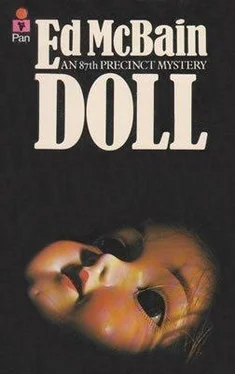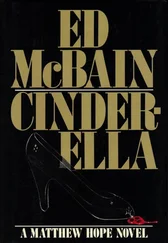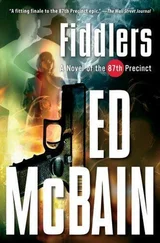‘Okay, so she was drinking tea before she got killed,’ Meyer said.
‘That’s right. The glass was on the night table near her bed, covered with her prints.’
‘Whose prints were covering the knife?’
‘Nobody’s,’ Grossman said. ‘Or I should say everybody’s. A whole mess of them, all smeared.’
‘What about her pocketbook? Kling’s report said—’
‘Same thing, not a good print on it anywhere. There was no money in it, you know. My guess is that the person who killed her also robbed her.’
‘Mmm, yeah,’ Meyer said. ‘Is that all?’
‘That’s all. Disappointing, huh?’
‘I hoped you might come up with something more.’
‘I’m sorry.’
‘Sure.’
Grossman was silent for a moment. Then he said, ‘Meyer?’
‘Yeah?’
‘You think Carella’s death is linked to this one?’
‘I don’t know,’ Meyer said.
‘I liked that fellow,’ Grossman said, and hung up.
Harvey Sadler was Tinka Sachs’s lawyer and the senior partner in the firm of Sadler, McIntyre and Brooks, with offices uptown on Fisher Street. Meyer arrived there at ten minutes to noon, and discovered that Sadler was just about to leave for the Y.M.C.A. Meyer told him he was there to find out whether or not Tinka Sachs had left a will, and Sadler said she had indeed. In fact, they could talk about it on the way to the Y, if Meyer wanted to join him. Meyer said he wanted to, and the two men went downstairs to catch a cab.
Sadler was forty-five years old, with a powerful build and craggy features. He told Meyer he had played offensive back for Dartmouth in 1940, just before he was drafted into the army. He kept in shape nowadays, he said, by playing handball at the Y two afternoons a week, Mondays and Thursdays. At least, he tried to keep in shape. Even handball twice a week could not completely compensate for the fact that he sat behind a desk eight hours a day.
Meyer immediately suspected a deliberate barb. He had become oversensitive about his weight several weeks back when he discovered what his fourteen-year-old son Alan meant by the nickname ‘Old Crisco’. A bit of off-duty detective work uncovered the information that ‘Old Crisco’ was merely high school jargon for ‘Old Fat-in-the-Can’, a disrespectful term of affection if ever he’d heard one. He would have clobbered the boy, naturally, just to show who was boss, had not his wife Sarah agreed with the little vontz. You are getting fat, she told Meyer; you should begin exercising at the police gym. Meyer, whose boyhood had consisted of a series of taunts and jibes from Gentiles in his neighborhood, never expected to be put down by vipers in his own bosom. He looked narrowly at Sadler now, a soldier in the enemy camp, and suddenly wondered if he was becoming a paranoid Jew. Worse yet, an obese paranoid Jew.
His reservations about Sadler and also about himself vanished the moment they entered the locker room of the Y.M.C.A., which smelled exactly like the locker room of the Y.M.H.A. Convinced that nothing in the world could eliminate suspicion and prejudice as effectively as the aroma of a men’s locker room, swept by a joyous wave of camaraderie, Meyer leaned against the lockers while Sadler changed into his handball shorts, and listened to the details of Tinka’s will.
‘She leaves everything to her ex-husband,’ Sadler said. ‘That’s the way she wanted it.’
‘Nothing to her daughter?’
‘Only if Dennis predeceased Tinka. In that case, a trust was set up for the child.’
‘Did Dennis know this?’ Meyer asked.
‘I have no idea.’
‘Was a copy of the will sent to him?’
‘Not by me.’
‘How many copies did you send Tinka?’
‘Two. The original was kept in our office safe.’
‘Did she request two copies?’
‘No. But it’s our general policy to send two copies of any will to the testator. Most people like to keep one at home for easy reference, and the other in a safe deposit box. At least, that’s been our experience.’
‘We went over Tinka’s apartment pretty thoroughly, Mr Sadler. We didn’t find a copy of any will.’
‘Then perhaps she did send one to her ex-husband. That wouldn’t have been at all unusual.’
‘Why not?’
‘Well, they’re on very good terms, you know. And. after all, he is the only real beneficiary. I imagine Tinka would have wanted him to know.’
‘Mmm,’ Meyer said. ‘How large an estate is it?’
‘Well, there’s the painting.’
‘What do you mean?’
‘The Chagall.’
‘I still don’t understand.’
‘The Chagall painting. Tinka bought it many years ago, when she first began earning top money as a model. I suppose it’s worth somewhere around fifty thousand dollars today.’
‘That’s a sizable amount.’
‘Yes,’ Sadler said. He was in his shorts now, and he was putting on his black gloves and exhibiting signs of wanting to get out on the court. Meyer ignored the signs.
‘What about the rest of the estate?’ he asked.
‘That’s it,’ Sadler said.
‘That’s what?’
‘The Chagall painting is the estate, or at least the substance of it. The rest consists of household furnishings, some pieces of jewelry, clothing, personal effects — none of them worth very much.’
‘Let me get this straight, Mr Sadler. It’s my understanding that Tinka Sachs was earning somewhere in the vicinity of a hundred and fifty thousand dollars a year. Are you telling me that all she owned of value at her death was a Chagall painting valued at fifty thousand dollars?’
‘That’s right.’
‘How do you explain that?’
‘I don’t know. I wasn’t Tinka’s financial advisor. I was only her lawyer.’
‘As her lawyer, did you ask her to define her estate when she asked you to draw this will?’
‘I did.’
‘How did she define it?’
‘Essentially as I did a moment ago.’
‘When was this, Mr Sadler?’
‘The will is dated March twenty-fourth.’
‘March twenty-fourth? You mean just last month?’
‘That’s right.’
‘Was there any specific reason for her wanting a will drawn at that time?’
‘I have no idea.’
‘I mean, was she worried about her health or anything?’
‘She seemed in good health.’
‘Did she seem frightened about anything? Did she seem to possess a foreknowledge of what was going to happen?’
‘No, she did not. She seemed very tense, but not frightened.’
‘Why was she tense?’
‘I don’t know.’
‘Did you ask her about it?’
‘No, I did not. She came to me to have a will drawn. I drew it.’
‘Had you ever done any legal work for her prior to the will?’
‘Yes. Tinka once owned a house in Mavis County. I handled the papers when she sold it.’
‘When was that?’
‘Last October.’
‘How much did she get for the sale of the house?’
‘Forty-two thousand, five hundred dollars.’
‘Was there an existing mortgage?’
‘Yes. Fifteen thousand dollars went to pay it off. The remainder went to Tinka.’
Twenty…’ Meyer hesitated, calculating. Twenty-seven thousand, five hundred dollars went to Tinka, is that right?’
‘Yes.’
‘In cash?’
‘Yes.’
‘Where is it, Mr Sadler?’
‘I asked her that when we were preparing the will. I was concerned about estate taxes, you know, and about who would inherit the money she had realized on the sale of the house. But she told me she had used it for personal needs.’
‘She had spent it?’
‘Yes.’ Sadler paused. ‘Mr Meyer, I only play here two afternoons a week, and I’m very jealous of my time. I was hoping…’
Читать дальше












